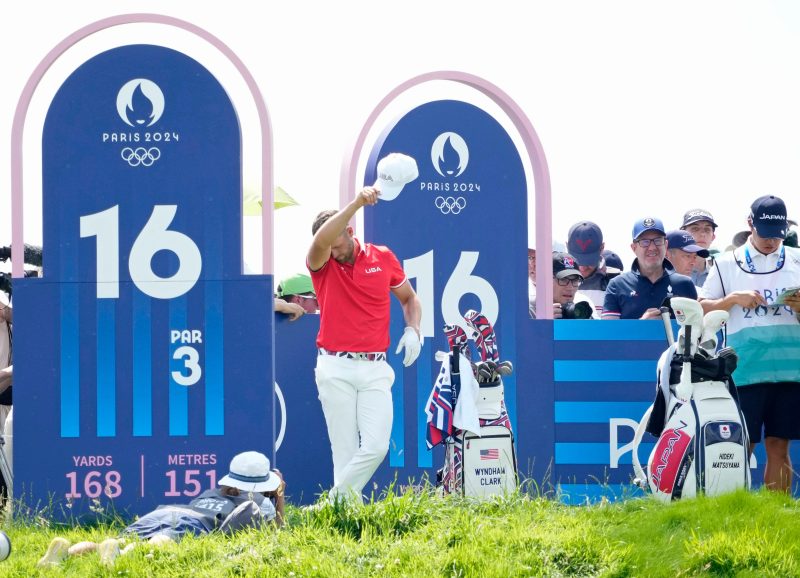SAINT-QUENTIN-EN-YVELINES, France – The thing about Wyndham Clark is he’s a streaky golfer.
When he’s right, he’s as good as anybody. You remember, right? He won the 2023 U.S. Open. Earlier this year, he shot a 60 to win a shortened event at Pebble Beach. He was second at Bay Hill, tied for second at The Players.
Clark has demonstrated why he deserved to be one of only four Americans who qualified for these Paris Olympics.
He just hasn’t shown it lately.
And that includes Thursday’s Olympics first round at Le Golf National. While most of the 60-player field took advantage of ideal scoring conditions on Day 1, Clark opened with a 4-over 75. His first three holes: bogey, double bogey, bogey. Though he stabilized from there, he closed with another double on No. 15.
2024 Olympic medals: Who is leading the medal count? Follow along as we track the medals for every sport.
That does no favors for the current Olympic qualifying system, which is based on world rankings and has drawn scrutiny in recent weeks and months, largely because it snubbed reigning U.S. open champ Bryson DeChambeau and sent a struggling Clark to Paris instead.
This keeps coming up because the U.S. team is the most difficult to make of any golfing country at the Olympics. That’s because only a maximum of four players can make it. Whereas Americans comprise the majority of a typical PGA Tour field, it’s 6.67% here.
“We get four guys because we’re all top 15 in the world,” Scottie Scheffler said, “and it’s still by far the hardest team to make. If we could bring all of our best players, the field for this tournament would look a lot different, and I’m sure we’d have a better chance of taking home some more medals. But we only get four guys. It’s hard to choose the best four.”
As the qualifying process continues to get attention and debate, the most likely it’ll get reevaluated before the 2028 Olympics in Los Angeles.
Spain’s Jon Rahm said this week that he’d prefer each country selects its team, like in basketball.
Scheffler said he prefers the current system because it’s subjective.
“We had some tournaments in amateur golf where the whole team was chosen at times,” Scheffler said. “I’m a fan of having a standard system where you know where you stand in terms of getting in – like it is now.”
It’s not Clark’s fault that DeChambeau (who finished No. 10 in the Olympics rankings) went to LIV, knowing that the decision could cost him dearly in the rankings. Never mind the fact, too, that Clark wouldn’t have been excluded even if DeChambeau had squeaked in this summer. Clark (No. 5) qualified ahead of USA teammate Collin Morikawa (No. 7).
Clark nonetheless becomes a lighting rod for criticism of the Olympic qualifying system because of how he’s playing.
He missed cuts in three of four majors and finished tied for No. 56 at the U.S. Open. He went through a stretch this season where he missed cuts in three of five tournaments. (Of course in the middle of that, he tied for third in Hilton Head, but that’s just Clark).
After Thursday’s round, Clark moved quickly through the media area, not stopping to field questions about his round. On Wednesday, however, he went into detail with reporters at Le Golf National about his struggles this year, saying he has been dealing with an injury since The Masters that has cost him club speed and length on his drives.
“You start going down rabbit holes that maybe I shouldn’t have gone down,” Clark said, “and next thing you know, I’m missing cuts by a little bit and not playing at the level that I was earlier in the year or some parts of last year. … I fully believe in my game when I’m playing good, and I believe I can beat anyone when I feel good.”
That happens in golf. You get a nagging injury. Your game gets off track. You start pressing to get it back and it takes you farther off course into the wilderness.
But you know what doesn’t usually happen in golf? This week. The Olympics is special. It felt different Thursday on the course, and a bunch of players said that afterward. This means more. It is for a country, not just for an individual.
And if an athlete isn’t fully healthy and uncomfortable with his or her game, does he or she give that country the best opportunity to win an Olympic medal? Didn’t seem like it Thursday.
Reach Tennessean sports columnist Gentry Estes at gestes@tennessean.com and on the X platform (formerly known as Twitter) @Gentry_Estes.

